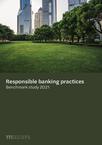Responsible banking practices: 2021 comparative assessment study
2021 Study on Responsible Banking Practices
The COVID-19 pandemic has highlighted the importance of the resilience of the financial system. Banks worldwide recognize that they have a crucial role in transitioning to a sustainable future aligned with the objectives of the United Nations Sustainable Development Goals and the Paris Agreement.
Our third comparative assessment study of responsible banking practices provides a more detailed analysis of the evolution of best practices and development trends in managing the risks of climate change and broader social and governance issues. Building on Mazars' previous report, "Responsible Banking Practices, Comparative Assessment Study 2020," our latest study identifies how banks are collectively taking responsibility for laying the foundations of a sustainable financial sector and contributing to healthier economies.
We segmented 37 banks (the largest in terms of total assets in their respective geographical regions) into four categories: standouts, leaders, supporters, and sympathizers. It is encouraging to see that more banks were assessed as leaders compared to the findings of the previous comparative assessment, scoring positively between 80% and 95%, despite the increased stringency of our evaluation criteria to reflect practice improvement and requirements.
However, many challenges still persist. There is still room for improvement, especially in regions where ESG sector guidelines and regulations are lacking. In fact, strong sustainability practices often occur alongside consistent sector and legal incentives.

